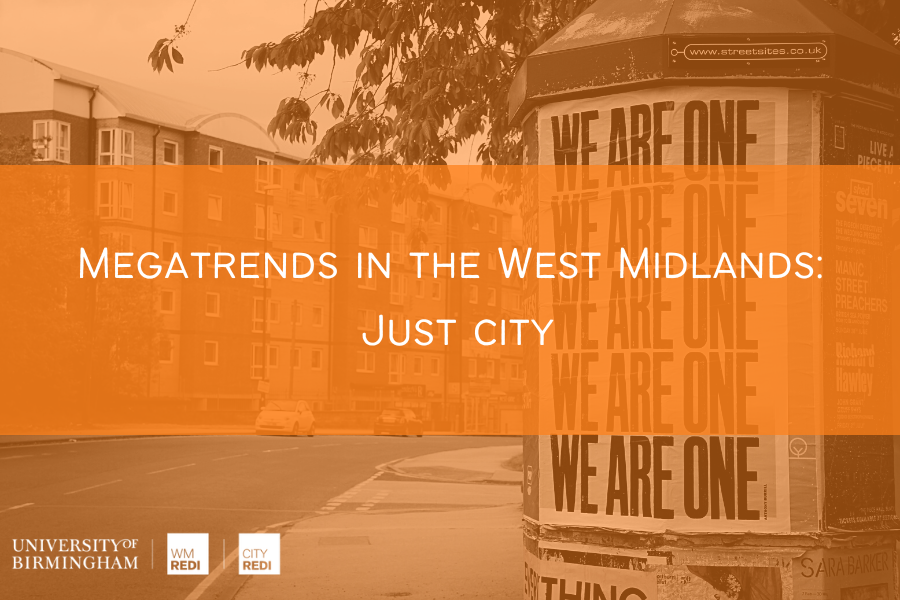
Liam O’Farrell looks at some of the megatrends associated with the idea of the Just City – how we can harness the transformative power of development to help address social injustices that are starkly visible in cities. This article is part of larger project looking at Megatrends in the West Midlands. Megatrends are major movements or patterns or trends that are having a transformative impact on business, economy, society, cultures and personal lives. The project examines some of these megatrends in a series of provocations, podcasts and a report. View the full provocation.
What is a ‘just city?
From growth and innovation to culture and diversity, cities are the engines of the modern world. They are where the values of societies are given form. Consider how the architecture of ancient Athens is synonymous with democracy, or how the skyscraper born in American boomtowns embodies global capitalism.
However, while cities represent the aspirations of their societies, they are also where social problems are concentrated. Uneven distribution of wealth and opportunities is starkly visible in cities. The challenge for policymakers is how to harness the transformative power of development to help address social injustice. This idea is known in the literature as the ‘just city’.
Key Issues
A just city is one in which ghettoisation, or the segregation of marginalised people, and gentrification, or the displacement of poorer people, are mitigated (Dlabac et al., 2019). This requires ensuring access to affordable housing of a decent quality. For decades, the UK has built fewer new units than required, driving up prices and forcing many to rent expensive, frequently poor-quality accommodation (Stephens et al., 2014). Historically, a key mechanism for regulating housing affordability and facilitating social mixing was social housing. However, the role of British local authorities in providing housing has been undermined since the introduction of the Right to Buy. This enabled many to own property for the first time, but dramatically reduced the availability of affordable housing, while also setting in motion trends toward greater segregation (Scanlon, 2017). A segregated society is one with less mixing of different groups, leading to polarization and social fragmentation (Morales et al., 2019). In Birmingham, ethnic minorities and white working-class residents are increasingly segregated in the inner-city and the urban periphery respectively (O’Farrell, 2020).
These areas have higher rates of benefit claimants and lower educational attainment. The city is marked by clear patterns of spatial injustice (Dlabac et al., 2019). Building a just city means developing strategies attuned to the needs of these communities, rather than a one-size-fits-all approach. Top-down, technocratic measures often misunderstand the behaviours and needs of target groups (Møller and Harrits, 2013). Participatory, bottom-up methods have proven themselves to be more effective in designing holistic responses.

The UK combines high-income inequality with low social mobility, as measured by intergenerational earnings and educational attainment (OECD, 2018) The country’s scores on these measures are among the worst in the developed world.
In the West Midlands, inequality has been growing. Even between 2001-2008, the longest period of growth in post-war history, real wages among the lowest paid in Birmingham fell between 3.5-4.5% (Fenton et al., 2010). In 2020, 44% of neighbourhoods (or LSOAs) in the Black Country belonged to the fifth most deprived in the country, and Birmingham had the greatest concentration of deprived neighbourhoods in the country by a considerable margin (MHCLG, 2020).
These challenges have been sharpened by austerity. Rough sleeping has increased by 141% in the past decade (Zakra, 2020). Homelessness in Birmingham is above the national average (O’Farrell, 2020c). Food bank dependency has increased over thirty-fold, from 61,468 emergency food parcels distributed in 2010/11 to 1,900,122 in 2019/20 (Trussell Trust, 2020). Moreover, research by scientists from a consortium of the UK’s top universities linked public spending cuts with 120,000 excess deaths from 2010-2014 (Watkins et al., 2017). These figures underscore the lethal effects of inequality.

Creating a just city requires strengthening democratic culture, building mutual trust between the public and institutions, and empowering citizens. While this point is not universally accepted (Fainstein, 2010), a common feature of states that perform best on measures of social mobility, such as Iceland, Finland, Ireland, and Belgium (OECD, 2018), is having sophisticated strategies of civic engagement. Participatory initiatives combine the technical knowledge of subject-matter experts with the lived experience of citizens, helping to root solutions in the social reality of the problem they seek to address (Negev and Teschner, 2013).
One possibility for the West Midlands is scaling up the USE-IT! community research model, which has proven its value in the Ladywood district. The model involved the University of Birmingham recruiting citizens and training them in research methods so they could subsequently work on policy research projects commissioned by organisations across the city. USE-IT! upskilled residents, helped anchor institutions better fulfil their civic role, and facilitated greater inclusion of local knowledge in decision-making processes (O’Farrell and Dlabac, 2020; Scheffler, 2020).

Future Scenarios
Baseline: ‘Do nothing’
In this scenario, the UK remains one of the most unequal countries in the developed world, and social mobility declines further
Worst case: ‘Singapore-on-Thames’
‘Singapore-on-Thames’ is shorthand for the UK making use of its new regulatory freedom to cut regulations on business. Britain is already one of the world’s most deregulated economies and further deregulation and cuts to what remains of the welfare state will compound this problem.
Ideal case: ‘Just cities’
The twin shocks of Brexit and Covid-19 can be used to pivot toward a just city. Commentators refer to the Brexit vote as a ‘cry of pain’ from ‘left-behind’ people (Liberini et al., 2017). Despite this, there has been no meaningful attempt by the government to heal the rift in British society, and there has been no mission to listen to those who feel their voices are unheard. Local civic engagement can be the first step to building a more participatory culture in the UK. Here are some examples:
- The ‘crowdsourced constitution’ project in Iceland demonstrates the potential of a positive participatory culture, where citizens improve the outcomes of decision-making processes.
- Preston Model demonstrates how anchor institutions can successfully work together on community wealth building.
- Social enterprises are another mechanism for creating a more inclusive economy.
- Targeting areas of deprivation with skills training, social services and better transport integration could help neutralise the damaging trends towards segregation seen in recent decades.

Key policy messages
- The segregation of disadvantaged people across the WMCA area is increasing, making the city region a microcosm of national trends. Civic engagement, affordable housing, skills training and improved connectivity can mitigate this.
- Investment predicated on HS2 is transforming central Birmingham but is not benefitting communities on the margins. Mechanisms to achieve inclusive growth need to be implemented.
- The Preston Model of community wealth building has proven to be more effective than deregulation and trickle-down economics in building an inclusive economy.
- Reduced demand for office space after the pandemic could depress city centre property markets. This suggests a need for more flexible spaces.
- Visions for the future should be developed by citizens, rather than local authorities seeking to anticipate the needs of investors.
This article is part of a larger project looking at Megatrends in the West Midlands. Megatrends are major movements or patterns or trends that are having a transformative impact on business, economy, society, cultures and personal lives. The project examines some of these megatrends in a series of provocations, podcasts and a report.
This blog was written by Liam O’Farrell, Researcher, University of Sheffield, and a City-REDI Associate.
Disclaimer:
The views expressed in this analysis post are those of the authors and not necessarily those of City-REDI / WMREDI or the University of Birmingham.
